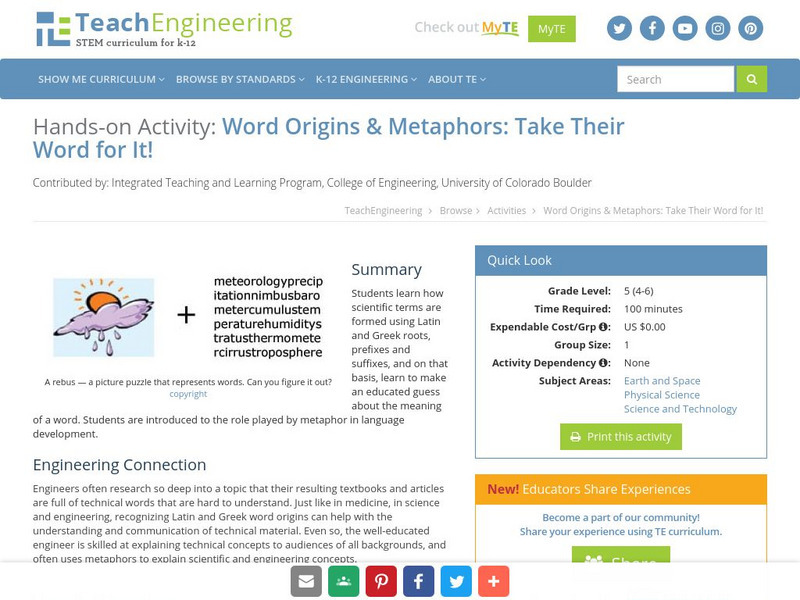Curated OER
Bunnicula
Students create a dictionary of vocabulary after reading a story. Individually, they create a story web making sure to include all of the basic story elements. They also create a timeline and write a book report of all important events.
Curated OER
Them and Us
Students consider social class issues in Great Britain. In this current events lesson, students visit selected websites and participate in a classroom discussion regarding social justice issues and segregation of social classes in Britain.
Curated OER
Hidden Persuaders
Students examine classic propaganda techniques to analyze factors which influence learning and thinking processes influencing formation of public opinion through these lessons.
Curated OER
Dragonwings
Middle schoolers engage in a lesson that is concerned with the literature study of Dragonwings. They write about the story from the perspective of a reader that is well informed towards the last chapters. Students also find target...
Curated OER
Rebus Writing Using Nursery Rhymes and a Book
Students write nursery rhyme rebus songs. In this music instructional activity, students practice writing rebuses as a class. Students then create their own rebus based upon "The Bag I'm Taking to Grandma's".
Curated OER
The Play's the Thing: The Drama of Cyrano de Bergerac
Students practice dramatic 'living' through various drama activities. In this drama lesson, students define drama, view examples of dramatic elements in Cyrano de Bergerac and Roxanne, define characterization within the dramas, study the...
Curated OER
Alice In Wonderland
Students compare and contrast surrealist paintings to Alice in Wonderland. In this literature lesson, students examine surrealism paintings and apply those principles to Alice in Wonderland. They explore how the artists...
Other
Etymological Dictionary: Influences on Astronomy
An interesting look at the meanings of many of the words in mythology that have been used in English astronomical field. This resource lists the word, etymological and mythological root or character, and modern English meaning.
Other
A. Word. A. Day
Still another site offering you a word a day to build vocabulary and understanding of new words. You can subscribe for free, or check out the archives.
TeachEngineering
Teach Engineering: Take Their Word for It!
Students learn how scientific terms are formed using Latin and Greek roots, prefixes and suffixes, and on that basis, learn to make an educated guess about the meaning of a word. Students are introduced to the role played by metaphor in...
TED Talks
Ted: Ted Ed: Where Do New Words Come From?
Marcel Danesi explains how new words enter a language. L.11-12.1a Gram/Usage changes
Other
Online Etymology Dictionary
The site, created by an avowed amateur, Douglas Harper, shares the origins of words. Students will type a word into a text box and click a "search" button to see the etymology of the word.
Other
Take Our Word for It
A bi-weekly Webzine of word origins. Includes a Spotlight word, answers to submitted questions, a curmudgeon's corner and other areas.
Other
World Wide Words/exploring the English Language
"World Wide Words is devoted to the English language - its history, quirks, curiosities and evolution. The Words site is organized into sections, each with its own index to help you find your way about."
Other
World Wide Words: Meritocracy
A relatively recent word, the term meritocracy is commonly used in a way not intended by the man who coined it. This article discusses the meaning of the term in its original usage, as well as its common use today.
Fun Brain
Fun Brain: Rooting Out Words
Three categories of words and four skill levels challenge players to identify the roots for the names of months, for numbers and numerical terms, and for a range of other words based on commonly used roots.
Lumen Learning
Lumen: Rhetorical Reading: Read Strategically: Diversify Your Vocabulary
This lesson plan focuses on strategies to diversify and retain new vocabularies such as reading a variety of types of writing and learning roots, suffixes, prefixes, and the etymology of words.
Other
Behind the Name
Site gives the etymology and history of first names. Have fun looking up yours! Names can be accessed alphabetically, by nationality, or through a search tool. Links to lots of other information on names and etymology.
TED Talks
Ted: Ted Ed: Mysteries of Vernacular: Lady
Why do we call women ladies? Well, etymologically-speaking, the word comes from the Old English words for hlaf (bread) and daege (maid), which, combined, mean the female head of the household and eventually indicated high social...
TED Talks
Ted: Ted Ed: Mysteries of Vernacular: Bewilder
The history of the word bewilder is more straightforward than you might think. Roots can be traced back to the Old English words wilde (undomesticated) and deor (untamed animals), eventually combined into the word wilderness. Jessica...
TED Talks
Ted: Ted Ed: Mysteries of Vernacular: X Ray
The story of the word X-Ray is one of great thinkers. French philosopher Rene Descartes isolated the letters X, Y and Z to stand for unknowns, and centuries later, Wilhelm Rontgen discovered the X-ray, using the X for the unknown nature...
TED Talks
Ted: Ted Ed: Mysteries of Vernacular: Dynamite
With an explosive meaning, the word dynamite's past is as historical as it is etymological. Jessica Oreck and Rachael Teel describe how Alfred Nobel invented dynamite. [2:14]
TED Talks
Ted: Ted Ed: Mysteries of Vernacular: Earwig
An earwig is neither an ear nor a wig; it is an insect. Jessica Oreck and Rachael Teel explain how folklore gave this bug its name, combining entomology with etymology. [2:16]
Texas Education Agency
Texas Gateway: Reference Materials Printed and Electronic
Learn how to use dictionaries, glossaries, and thesauri in order to determine meanings of words and phrases, including their denotations, connotations, and etymologies.























